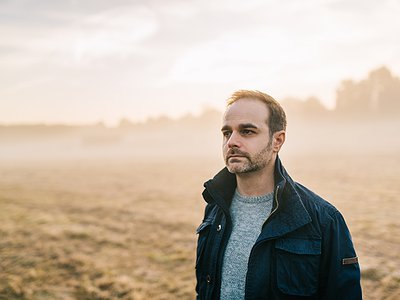Name: Thomas Lemmer
Nationality: German
Occupation: Producer
Current Release: AMBITRONIC on Sine Music
Recommendations: One song, that has touched me so much and which belongs to my all time favorites is "Just to let you know" from Cultured Pearls. To me, one of the best written and produced songs I have ever heard. Astrid North's voice is so touching and expressive in this song. I just love it. You should listen to it very loud.
A book or painting ... there is just too much I haven't read I guess and to be honest, I love art in any form, but I'm very bad at remembering the artist's names apart from musicians of course. Shame on me...
Contact/Website: If you enjoyed this interview with Thomas Lemmer, his website and Facebook profile offer plenty of information and current news.
When did you start writing/producing music - and what or who were your early passions and influences? What is about music and/or sound that drew you to it?
I think I started composing at the age of 16. At that time, I had a pop duo and we started writing our own songs. So my first writing experience was together with a singer. As we now had our own songs, I played them for my piano teacher at that time. He then asked me when I would like to record these songs in a studio as he was a producer as well. So that was my first experience with producing music. After that, I started with two cassette players to record my own demos at home. Musically I was influenced mainly by pop music at that time. I loved and still love for instance Phil Collins, Genesis, The Beatles or Michael Jackson. That was the music I listened to. I still remember listening with the headphones to all the musical details a Michael Jackson production has or how Phil Collins's "In the air tonight" fascinated me. But I was also influenced by playing a lot of classical music on the piano which helps me a lot today when writing music. I think what really drew me to music production was that I was simply fascinated by music production. I bought so many records at that time and listened to every little detail of each production and dreamt of doing that myself.
For most artists, originality is first preceded by a phase of learning and, often, emulating others. What was this like for you? How would you describe your own development as an artist and the transition towards your own voice? What is the relationship between copying, learning and your own creativity?
For me it was the same. In my first band, we covered the songs we loved and tried to imitate the artists we looked up to. It was only when I started writing my own music that I started developing as an artist – in the sense of an artist who writes and produces new music. But this development is something which never ends, I believe. OK, I would say I have developed and found my own sound today. But the development as an artist is a lifelong thing I believe.
Regarding the relationship between copying, learning, and my own creativity I would say that copying is something you should absolutely avoid. Instead, I'd say you should focus on the inspiration you get from a different artist or piece of music. What is it that inspires you and how can you transition that towards your own sound. Learning new things is essential to me and to the process of becoming a better musician and producer. By going new ways and learning how others do it, you widen your horizon and ultimately your creativity benefits from it. Compare it to taking photos. If you change the perspective with the camera, you suddenly get new inspirations for the photo.
What were your main compositional- and production-challenges in the beginning and how have they changed over time?
Compositional challenges have always been the inspiration itself. I think every producer or composer knows how it feels if you want to write, but you have no idea or inspiration. Or you're stuck and can't move forward with a composition. This happens to me still. But over time I learned that you should never give up. Inspiration comes while you're working on it and it's so important to not put yourself under pressure and believe that everything you write must be THE hit. So I've accepted the challenge and enjoy it even more when I have completed a great piece of music. Well, at least from my perspective.
The production challenges, in the beginning, were, of course, the limitations I had compared to the technology I or we have today. As I said, I started with two cassette players, then had an 8-track tape recorder before I was able to synchronize a computer with MIDI to it. But this made me creative as well. Today, the endless possibilities of our computer-based studios are another challenge as well.
What was your first studio like? How and for what reasons has your set-up evolved over the years and what are currently some of the most important pieces of gear for you?
The centre of my first studio was the TASCAM 488, an 8-track tape recorder which I later connected and synchronized to a PC. The PC was used for the MIDI tracks. Then later I bought a Roland VS-1680 which I bought because of these virtual audio tracks. It was amazing to record vocals for the first time without worrying about pushing the record button a bit too early or late. Also, the sound quality was a big change for me.
Over the years I had many different keyboards. The ones I loved the most, I always kept. For example, my Roland Juno 60 which I will surely never sell.
Today, the centre of my studio is my DAW with Cubase, NI Komplete Kontrol and Maschine. However, to me and my sound, it's very important to have external "real" sound sources. I use a lot of outboard equipment as I believe that this makes the difference for my own sound. Also, it feels more natural to me using real instruments. The most important is probably my Korg Kronos X. But all different analog synths I have are not less important, especially for my very own sound.
How do you make use of technology? In terms of the feedback mechanism between technology and creativity, what do humans excel at, what do machines excel at?
That's an interesting question. Well, the technology helps me to stay creative or inspires me at least. Often I play with sounds or an arpeggiator for example which then leads to a new idea for a new track.
So the technology helps to bring up ideas which I never had without it. It's almost like an extension of your creative potential.
Production tools, from instruments to complex software environments, contribute to the compositional process. How does this manifest itself in your work? Can you describe the co-authorship between yourself and your tools?
A good example is the track "A IV" from my current album AMBITRONIC. When I started with this track I had no real idea about how this song should sound like. There was no clear vision or melody yet. The only thing I did was playing with sounds on my microKORG. It sounded cool, but it was far from a new song. Then I opened a vocal sample-based plug-in, played around with it and suddenly I developed this main chorus vocal melody. Without technology, I would never have written this track. The composition was more or less based on this extended creative potential of the computer which lead to this result.
Collaborations can take on many forms. What role do they play in your approach and what are your preferred ways of engaging with other creatives through, for example, file sharing, jamming or just talking about ideas?
I love collaborating with others. I've done many different forms of collaborations, but the one I love the most is working with a great musician or producer in the studio. This direct interaction and seeing how different someone else starts or comes up with ideas is a huge source of inspiration to me. Of course file sharing also works great, but you always feel limited.



